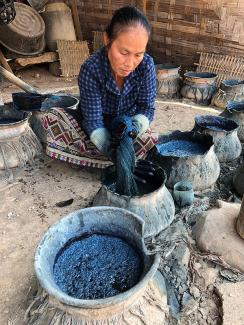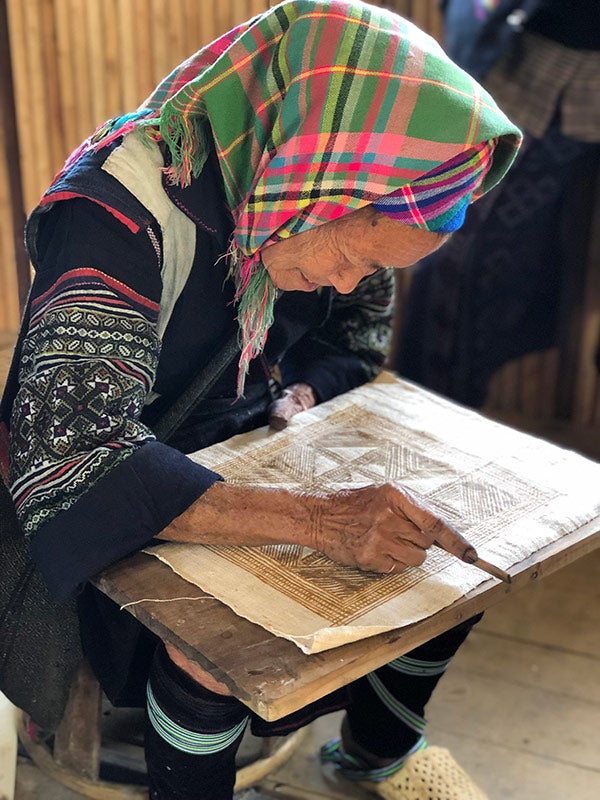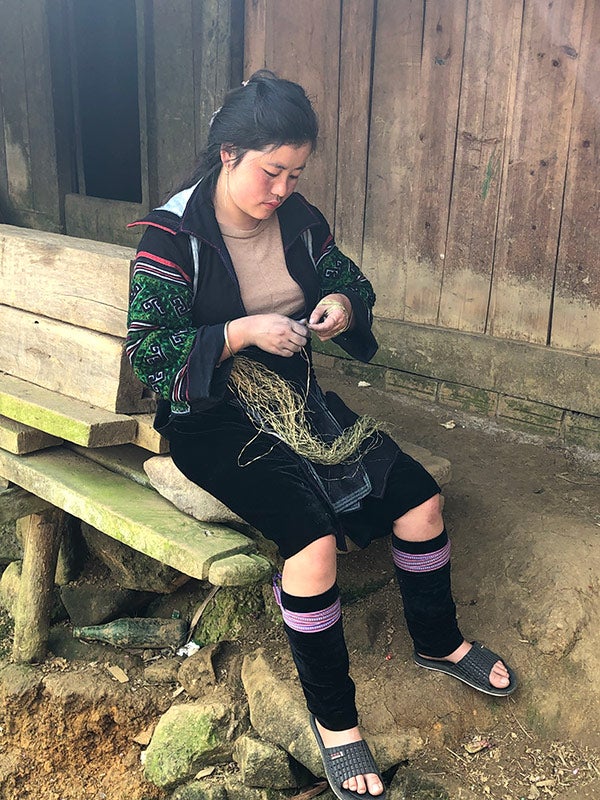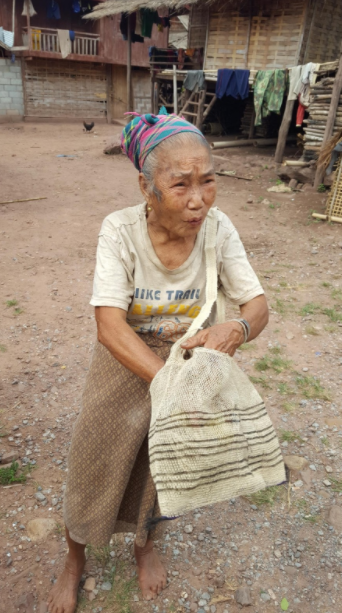
Taleo Handmade works with weavers, natural dyers, batik artisans, and embroiderers from remote villages in Laos and Vietnam. A fair trade business, Taleo Handmade derives its name from the Lao word taleo, the woven bamboo talisman used to protect homes and communities from spirits. In this spirit of protection, Taleo Handmade focuses on empowering women through economic opportunity, maintaining Indigenous traditions, and protecting the environment through the use of natural and sustainable materials and zero waste design. “Tai Lue women are famous for our weaving. I learned to weave when I was 7 years old from
my mother. Every Tai Lue girl learns to weave. We have looms under our houses, which are built on stilts. We weave our own sinhs, traditional Lao skirts and we weave shawls to wear to the temple,” says Bouathong (Tai Lue), a weaver and Taleo Handmade artisan partner in Laos.
Taleo Handmade’s artisan partners produce textiles unique to their ethnic groups. Founder Sally Strasser explains the process: “Hmong women [in Laos and Vietnam] grow, process, and weave hemp as the base material for their traditional clothing. They decorate it with hand drawn Hmong motifs in beeswax and dye it in natural indigo. The cloth is then boiled to remove the wax, revealing complex designs, a technique known as batik.” Taleo Handmade creates pillows, table runners, and bags from exquisite Hmong batik and embroidery. Their designs are sewn by women in small family owned workshops in Hanoi, Vietnam and Vientiane, Laos.

Chai (Hmong), artisan partner, drawing batik on handwoven hemp.
Taleo Handmade is committed to compensating both their artisan partners and their finishing seamstresses with fair trade wages. Through their fair trade practices, Lan (Hmong), one of Taleo’s artisan partners in Vietnam, says she is able to send her three young daughters to school—something that her family was unable to provide for her when she was young. “Hmong people in Vietnam face many challenges,” Lan says. “We can only grow one rice crop per year because we live in the mountains and it is too cold to grow rice much of the year. We cannot grow enough rice to feed our families, so we have to supplement our income, but there are not many jobs for Hmong people. We like to sell our handicrafts and used clothing to get extra income for our families.” She adds, Hmong clothing is a reflection of our culture; it is a very important part of our identity. We believe that hemp fabric will help to guide our spirits to heaven after we die. The Hmong symbols in our batik and embroidery tell the story of our culture.”

Bouathong (Tai Lue), artisan partner, dyeing cotton thread in natural indigo.
Another Indigenous Peoples in Laos, the Khmu, are renowned for their hand knotted bags made from a locally foraged liana vine. Khmu women gather the vine after the rainy season, strip it into raffia-like fibers, twist the fibers into thread, and hand knot it, a technique traditionally used for fishnets and tumpline bags. They sell their work to tourists and to shops in Laos, but it is the consistent orders from Taleo Handmade that provide a sustainable income for Khmu women. Taleo pairs their vine products with Hmong hemp fabric to create one-of-a-kind bags and pouches, which enables their Khmu artisan partners to sell more of their work.
Tai Lue women, also of Laos, are expert weavers and natural dyers specializing in indigo. Bouathong explains, “We grow our own cotton, process and spin it into thread, and weave it. We use all natural dyes for our cotton, specializing in indigo, which we also grow. We use turmeric root, tamarind seeds, sappan wood, lemongrass, and other roots, flowers, and seeds for our natural colors.” The weavers hand spin the cotton into thread and dye the skeins of thread in natural dyes. They weave shawls in traditional complex patterns and scarves in a simpler plain weave that highlights the texture of their handspun thread and the subtlety of the natural colors. Bouathong says she “is proud of the Tai Lue weaving traditions and is grateful that people from other
countries appreciate my work.”

Taleo Handmade is dedicated to assisting their artisan partners in reaching a broader market for their extraordinary textiles. Supporting the work of Indigenous women in Laos and Vietnam, enables their families to access better education, nutrition and healthcare, and ensures that their textile traditions are passed down to the next generation.
Check out our Summer Cultural Survival Bazaars:
July 18-19, 2020 in Newburyport, MA, and
July 25-26, 2020 in Tiverton, RI
For more information, visit: bazaar.cs.org
Top photo: Lan (Hmong), Taleo Handmade artisan partner, splicing hemp fibers.
All photos by Sally Strasser.
